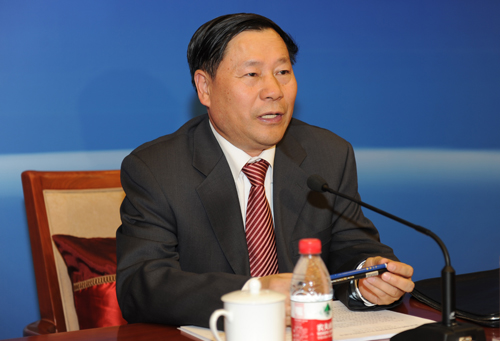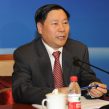
Exploring the International Aspects of China’s Ideological Crackdown
Publication: China Brief Volume: 13 Issue: 11
By:

The first aphorism of politics is that “all politics is local,” and one of the first rules of China watching is to look for domestic factors. The party’s domestic focus is highlighted by signs of ideological conservatism and Chinese President Xi Jinping’s “China Dream” to build up the state (“Centralized Power Key to Realizing Xi’s ‘China Dream’,” China Brief, March 28). The international component of the “China Dream”—becoming a prosperous country with a strong army (fuguo qiangjun)—however, is more than just economic and military capability and includes softer issues, such as status and influence. Although the most likely explanations for Beijing’s internal crackdown probably still are domestic, China’s internal dynamics have an international element linking Xi’s return to party orthodoxy with China’s threat environment, potentially coloring how Chinese leaders view their foreign relations toward the paranoid. Regardless whether Chinese fears are real, if Beijing acts upon them, they become a genuine concern for China’s neighbors.
Prior to his ascension to leadership, all signs pointed to Xi taking a more state-centric approach to running China and there were few indications that he would adopt wide-ranging reform measures—just as the “China Dream” suggests. He unapologetically endorsed socialism with Chinese characteristics and the need for confidence in the Chinese theory, path and system (lilun zixin, daolu zixin, zhidu zixin) (Xinhua, March 17; “The Unrepentant China Model,” China Brief, November 30, 2012; “China in 2012: Politics and Policy of Leadership Succession,” China Brief, January 20, 2012). This perspective probably is behind Xi’s view that the party needs to take a broader view of the organization’s history, avoiding the temptation to use the pre- and post-reform experiences to contradict each other (Guangming Daily, May 7; People’s Daily, January 6).This seemingly pro-Maoist sentiment really appears to be more about protecting the party from itself. Similarly, to insulate the party from society’s criticism, Xi also has promulgated the “Seven Unmentionables” (qi bu jiang)—universal values, freedom of the press, civil society, citizens’ rights, the party’s historical errors, the capitalist elite and judicial independence—which affects at least teaching and speaking on university campuses (Ming Pao [Hong Kong], May 14).
When viewed in combination with articles that seem to whitewash dark periods in party history, such as the Anti-Rightist Movement, that deny the value of the Chinese constitution or that involve a culling (no matter how justified) of party membership, it is hard not to see these developments as being domestically focused (Global Times, May 22; Red Flag, May 22; People’s Forum Biweekly Political Commentary, May 18; South China Morning Post, May 14). There is, however, an international context to consider, because the preservation of the party is one of the core interests Beijing routinely broadcasts (Xinhua, November 17, 2012; September 6, 2011).
These measures to assert control and encourage a stronger appreciation of the “socialist core values” (shehui zhuyi jiazhiguan), however, seem to serve a protective function against ideological subversion from abroad. While the party press maintains a steady background noise on the need to be alert to subversion from “Western hostile forces,” Chinese concerns appear to have been rising in recent years, given the concerns about international cultural struggle and the need to propagate China’s soft power (Qiushi, January 1, 2012; “Plenum Document Highlights Broad Role for Social Management,” China Brief, October 28, 2011). More recently, the Work Report of the 18th Party Congress noted “Hegemonism, power politics, and neo-interventionism has increased,” which not only damages China but also undermines the tenets underpinning the international system (Xinhua, November 17, 2012). A recent editorial also opined Western hostile forces have never stopped trying and probably have increased their efforts to Westernize and divide China. This situation threatens to derail reform during this crucial period as China faces a diverse set of social problems (People’s Daily, May 22).
Most interestingly, earlier this year, a senior People’s Liberation Army (PLA) officer with responsibility for international assessments echoed the concern about subversion, albeit through a less ideological lens. Lieutenant General Qi Jianguo, the deputy chief of the PLA General Staff with the foreign affairs and intelligence portfolio, outlined in a publication of the Central Party School a series of challenges facing China internationally as great power competition intensifies. Foremost among five problems is Western penetration and subversion through “multiple channels, including military deployments, political transformation, economic control, and cultural penetration.” While Qi downplayed the usefulness of military power, he did highlight that “soft penetration” can achieve “psychological control,” which is a greater long-term challenge. The main development in the U.S. strategic direction is the rebalance toward Asia; however, there is a “contradiction between its objectives being too big and its abilities insufficient. U.S. power is on the decline and leading the Asia-Pacific is beyond its grasp” (Study Times, January 21). Given the framework of the article, Qi seems to imply Beijing will need to be more concerned with U.S. efforts to influence China not involving military means to compensate for Washington’s decreasing ability to lead the Asia-Pacific on the basis of military power.
One of the other challenges, which Qi warned of, was the rise of “neo-interventionism” (xin ganshe zhuyi)—a phenomenon that undermines the principles of sovereignty and equality that have underpinned the international system since the Treaty of Westphalia in 1648 (Study Times, January 21). Since the UN-sanctioned intervention in Libya that evolved into regime change, Beijing has been warier of the “responsibility to protect” doctrine promulgated in 2005. An analysis appearing in the official press noted the doctrine subverts the Westphalian contract as well as the principles of the UN charter, because it justifies great power interventions in smaller countries but says nothing of protecting smaller countries from bullying (Xinhua, January 14). Most recently, Chinese Ambassador to the United States, Cui Tiankai, warned against employing the “responsibility to protect” doctrine, because it is not always clear “who is protecting whom, and who is protecting what” and for what purpose (Foreign Affairs, May 15).
A third area of concern relates to non-traditional security threats, such as terrorism and cyber security. The latter, according to Qi, “concerns national sovereignty as well as the security of economic and social operations, and it concerns the quality of human existence…the West’s so-called ‘Internet Freedom’ actually is a type of ‘Internet Hegemony’” (Study Times, January 21). One of the reasons for Chinese concern, as it appeared in a party journal, is that Internet-based new media remains too independent from the government’s efforts to shape public discourse, and some see the Internet-based media as a way to damage the party. Instead, the party needs to find a way to encourage the positive aspects of the new media to help the party perform, just as traditional propaganda apparatus has done for print journalism (Red Flag, May 21). The Western approach to Internet freedom denies China what Beijing describes as its sovereign rights over information flows within its country, feeding the aforementioned concerns about subversion and “neo-interventionism.”
Chinese society is changing dramatically and forcing the party’s governance strategies to evolve along with it. The party’s priorities—even with respect to national rejuvenation—remain largely domestic, because Chinese leaders believe the party’s survival may be at stake (“Xi Jinping’s ‘Southern Tour’ Reignites Promises of Reform,” China Brief, December 14). Given the stresses on the party and their potential connections to foreign threats, observers should not draw a clean separation between domestic communist party orthodoxy and Beijing’s evaluation of foreign intentions. Nor should observers rule out the possibility that some seemingly domestic measures for restricting public debate and strengthening party rule are related to Chinese perceptions of foreign actions and intentions. No matter how paranoid the idea of foreign subversion in the 21st Century may sound, if Beijing is, in fact, acting upon these concerns, then a more assertive and less placable China probably is the result.





